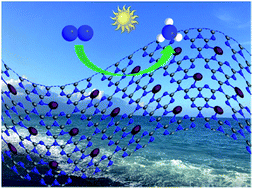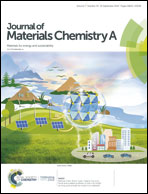Single-atom molybdenum immobilized on photoactive carbon nitride as efficient photocatalysts for ambient nitrogen fixation in pure water†
Abstract
A series of Mo single-atom catalysts were prepared by calcining a low-cost primary material of urea with various amounts of Na2MoO4·2H2O. Isolated Mo centers are immobilized on in situ formed polymeric carbon nitride via coordinating with two N donors to form two-coordinated MoN2 species. The low-coordinated Mo centers can serve as active sites for N2 chemisorption and activation, achieving high photocatalytic activity for NH3 evolution with a rate of 50.9 μmol gcat−1 h−1 in pure water. In the presence of ethanol as the electron scavenger, the NH3 evolution rate can reach 830 μmol gcat−1 h−1, and the catalyst shows a quantum efficiency of 0.70% at 400 nm. This is the first single-atom catalyst that can drive photocatalytic N2 fixation in pure water with comparable performance to recent reports for photocatalytic N2 reduction. Experimental investigations and density functional theory calculations demonstrate that the coordinatively unsaturated metal center in the single-atom catalysts can strongly adsorb N2via an end-on configuration to elongate the N![[triple bond, length as m-dash]](https://www.rsc.org/images/entities/char_e002.gif) N bond from 1.11 Å to 1.15 Å, and thus photoexcited electrons can transfer to the weakened N
N bond from 1.11 Å to 1.15 Å, and thus photoexcited electrons can transfer to the weakened N![[triple bond, length as m-dash]](https://www.rsc.org/images/entities/char_e002.gif) N bond for efficient nitrogen fixation under ambient conditions. These findings provide new insight for solar-driven N2 fixation by atomically dispersing low-coordination metal centers on photoactive supports.
N bond for efficient nitrogen fixation under ambient conditions. These findings provide new insight for solar-driven N2 fixation by atomically dispersing low-coordination metal centers on photoactive supports.



 Please wait while we load your content...
Please wait while we load your content...